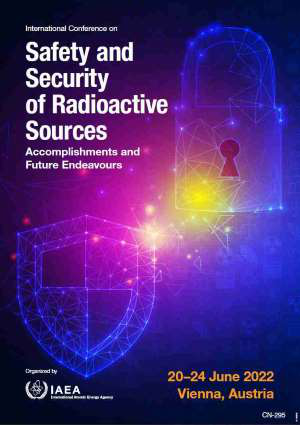Speaker
Description
The current technological advancement in nuclear science and technology has led to the application of tens of thousands of radioactive sources worldwide throughout medicine, industry, agriculture, academia, and government facilities for a variety of purposes. These materials are stored in thousands of facilities of which many are poorly secured and vulnerable to theft as well as safety. These sources pose a serious safety risk and security threat and could be readily employed by adversary for malicious intent. Radiological terrorism is an increasing threat and states as well as the private sector must do more to secure these dangerous materials and keep them out of the hands of terrorists. The international basic safety standards for protection against ionizing radiation and for the safety of radiation sources (BSS) require the establishment and implementation of security measures of radioactive sources to ensure that protection and safety requirements are met. The IAEA has engaged in an extensive effort to establish and/or strengthen national radiation protection and radiological safety infrastructure, including legislation and regulation, a regulatory authority empowered to authorize and inspect regulated activities, an adequate number of trained personnel and technical services that are beyond the capabilities required of the authorized legal persons of which Ghana has benefited in diverse ways. In Ghana, effort is made to strengthen safety and security of these materials through national and international engagement. The Nuclear Regulatory Authority, Ghana established by Act of Parliament, NRA Act 895 has made steady efforts to strengthen national radiation safety and security infrastructure by participating in IAEA model project for upgrading radiation protection infrastructure by implementing the code of conduct on the safety and security of radioactive sources and the guidance on the import and export of radioactive sources. Ghana has adopted the code and conduct on safety and security of radioactive sources. Ghana is also participating in a number of TC and interregional and regional projects such as Technical Cooperation (TC) project GHA/9/004 Radiation Protection Services, Interregional Project INT/9/143 Upgrading Radiation Protection Infrastructure, RAF/0/048 Establishing adequate national legal frameworks for the safe, secure and peaceful use of nuclear energy, which complies with the relevant international legal instruments and IAEA standards assisted in the development of a National Regulatory System (Procedures for notification, authorization, licensing, inspection and enforcement), AFRA Projects RAF9051 and RAF9045: Strengthening the regulatory framework and national infrastructure for safe management of radioactive waste and protection of the public and the environment, trained personnel and developed guidance document needed for radioactive waste management, INT 9/182 Sustaining Cradle – to-Grave Control of Radioactive Sources- Human resource development, GHA9008: Sustaining Regulatory Infrastructure for the Control of Radiation Sources and Nuclear Materials – procurement of Regulatory inspection equipment, RAF9058 (2017): Improving the Regulatory Framework for the Control of Radiation Sources in Member States and INT9180 (2012): Sustaining the Safe Transport of Radioactive Material by Promoting the Harmonization of Transport Regulations and Building Regulatory Capacity and Outreach to the Transport Community to Address Global Issues Including Denial of Shipment. The Paper will identify the progress and the challenges faced in implementing these projects to enhance safety and security of radiation sources in Ghana.
| Country OR Intl. Organization | Ghana |
|---|

